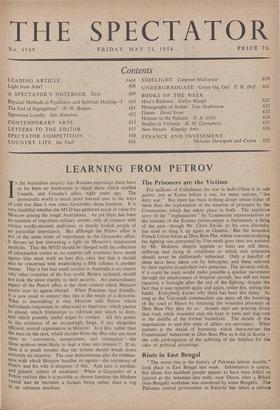The Prisoners are the Victims
For millions of Frenchmen the war in Indo-China is la sale guerre, just as Korea before it was, for many nations, " the dirty war." But there has been nothing dirtier about either of them than the exploitation of the miseries of prisoners by the Communists which has taken place in both. The repulsive story of the " explanations " by Communist representatives to the inmates of the Korean prison-camps is fortunately a thing of the past—though Mr. Chou En-lai, to his own discredit, has tried to drag it up again at Geneva. But the wounded French Union forces at Dien Bien Phu, whose evacuation during the fighting was prevented by Viet-minh guns (and not assisted by Mr. Molotov, despite appeals to him) are still there, suffering and dying in conditions to which sick prisoners should never be deliberately subjected. Only a handful of them have been taken out by helicopter, and these selected by their captors to suit their own purposes. The air-strip which, if it could be used, would make possible a quicker movement through the employment of hospital aircraft, has still not been repaired, a fortnight after the end of the fighting, despite the fact that it was repaired again and again, under fire, during the battle. Everybody knows why there has been this delay. So long as the Viet-minh commanders can stave off the bombing of the road to Hanoi by retaining the wounded prisoners at Dien Bien Phu they do so. Armed men are pouring down that road, while wounded men are kept in tents and dug-outs in the middle of the former battlefield. The details of the negotiations to end this state of affairs are secondary. What matters is the denial of humanity which characterises the Communists' behaviour in Dien Bien Phu as it did in Korea— the cold prolongation of the suffering of the helpless for the sake of political advantage.


































 Previous page
Previous page